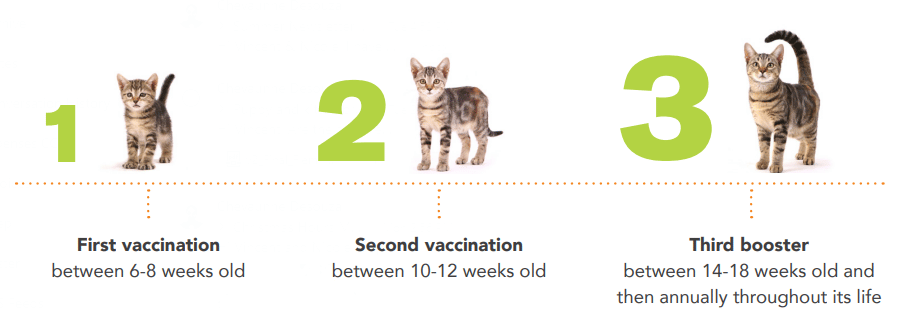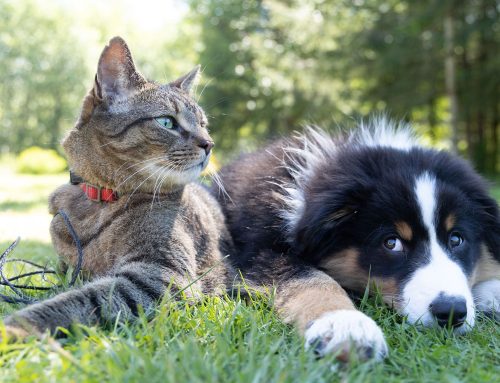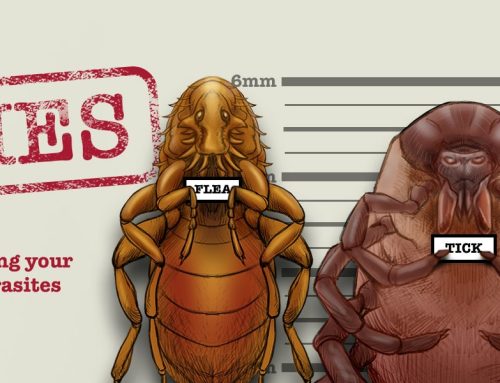Congratulations on bringing your new kitten home!
To give your new kitten the best start in life, there are quite a few considerations that we need to think about. Our vets will cover all this information (and more) during your kitten health visits.
Vaccinations
Vaccinations are the best way to protect your kitten fro several dangerous diseases. There are two types of vaccinations that cats can receive: F3 and FIV. An F3 vaccination provides protection against feline panluekopaaenia virus, feline herpesvirus1 and feline calicivirus. There is a separate vaccine for feline immunodeficiency virus (FIV) – this is recommended for outdoor cats. Read more about FIV here.
Kittens require a total of 3 vaccinations – the first one starts between 6-8 weeks, then they are given every 4 weeks. The last vaccination usually finishes between 14-16 weeks of age.

Parasite control
Cats require protection against intestinal worms and external parasites (fleas, mites and lice). For adults, the parasite prevention depends on their lifestyle. For kittens, however, we recommend following the kitten worming protocols until they are at least 6 months of age.
Intestinal worms
Intestinal parasite infections can cause your kitten to become very unwell. What’s more, some worms can even be transmitted to humans. The frequency of worming changes as your kitten gets older:
- Worming every 2 weeks until 12 weeks of age
- Worming every month between 12 weeks and 6 months
- Working every 3 months after 6 months of age or every month if using certain combination products
External parasites:
External parasites include fleas, mites and lice. All of these parasites can cause itchiness and even dermatitis, skin infections or allergic reactions. Flea prevention is recommended all year round. However, this is also dependant on the lifestyle of your cat. We may focus less on external parasite prevention if you cat is indoors-only. Do note that cats and dogs share the same type of fleas so if you have a dog in the household, flea prevention is recommended for all pets.
In the Melbourne area, we do not see ticks in the environment, but this is a significant problem interstate or in East Victoria. If you are planning to travel with your cat, please get in touch with us for more tick advice.
Choosing the correct anti-parasite products can be confusing. Our team can help you navigate through the options and help you choose the best product that is suited to you and your new kitten.
Desexing
We recommend desexing your cat at 6-7 months of age for both male and female cats. The average female cat will go into heat from 6 months onwards. The timing also depends on the bread and individual. Read more about the desexing process here.
Microchipping
Kittens are usually microchipped before leaving the breeder or before adoption. The microchip number of your new kitten is linked to an online database. New pet owners should ensure that their details are linked to the microchip database. Some breeders or adoption agencies will register new pet owners directly, but some will provide a form for kitten owners to perform a change of ownership themselves. If your kitten does not have a microchip, out vets can implant one, but you will need to register for a breeder source number.
Read more about microchipping your kitten.
Nutrition
We recommend feeding your kitten a premium-grade commercial kitten food that is formulated to meet their exact nutritional requirements. Premium brands generally contain higher quality ingredients and less fillers which means better nutrition for your growing kitten! Up to 12 weeks of age, we recommend feeding your kitten three times per day. You can then reduce meals to twice daily after this. Most kitten should receive kitten food until 12 months of age. We recommend making any dietary changes gradually over 5-7 days to avoid any tummy upsets. It is recommended to eventually feed your kitten predominantly dry food to maintain good dental hygiene – read more about dental care here.
Behaviour
Part of your kitten’s charm is their stubbornness, independence, and free spirit. This also means that they can be less responsive to training than a puppy. However, kittens can still be trained!
For new cat owners, it is important to note that cats don’t misbehave on purpose. Many of the behaviours that we might consider undesirable can just be normal and natural behaviours for a cat. These might include scratching, jumping, climbing, or even vocalising at night.
It is also very important to provide environmental enrichment, particularly for indoor cats. This is the process of providing physical and mental stimulation. Here are some tips:
- Making feeding time more interesting – use food dispensing puzzle toys or bowls. Puzzles are a great way for your cat to pass the time and stay active.
- Provide places to hide and climb. Window hammocks are a great way for your indoor cat to watch the outside world go by. For more timid cats, set up some private retreats around the house – this may be as simple as putting cardboard boxes in every room.
- Grow some cat grass or cat mint – some cats love to nibble on plants. Cat grass is a safe way to redirect this behaviour – this not only provides fibre that reduce hairballs but also save your precious indoor plants (some of which can be toxic to cats!)
- Set aside play time every day – this is valuable bonding that that also keeps your cat active
Our team looks forward to meeting you and your new kitten. To make an appointment, give us a call on (03) 9372 7655.





